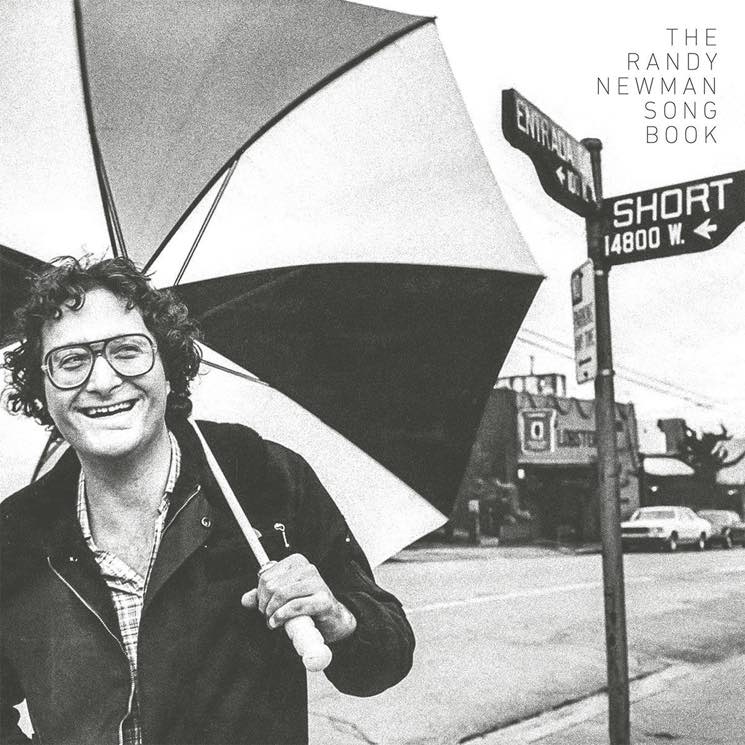Randy Newman is: the kind of fella that you'd want in your living room at your piano; the man you'd find in the parlour in a time gone by; quite the storyteller; and quite the cynic. He revels in Americana, but doesn't mind pointing out that the stars and stripes might be a little faded, a little jaded or that the flag's a little torn around the edges.
He's not quite as revered as, say, Harry Nilsson, Paul Simon or a friend of his by the name of Bruce; Newman remains underrated and underappreciated. The man's composed more film soundtracks than albums of his own — 23 to his 10 studio albums — and though his soundtracks may be what more of us recognize him for (most will be familiar with "You've Got a Friend in Me," from Toy Story), in certain circles, his albums are considered songwriting masterpieces that blend good melody with great irony.
The Randy Newman Songbook is a four-LP collection of Newman's solo recordings, new performances of songs plucked from throughout his career. Songbook highlights the fact that simplicity works in Newman's favour; stripped down to just Newman and the piano, his songs hold as much power as their fuller selves, and some of these takes make the originals sound like their instrumentation is an unnecessary distraction. Newman can play, and there seems to be no end to the melodies that his mind and hands can churn out together.
Here, he goes from old-timey rags ("I Love to See You Smile"), to songs tinged with nostalgia that aren't his own ("Louisiana 1927," "Dayton, Ohio - 1903"), to simple but stirring instrumentals ("Avalon," "Family Album," "When She Loved Me," "Ragtime"), to songs that seem questionable until you realize their true meaning — "Yellow Man" and "Short People," for example, deal with prejudice. "Political Science" satirically speaks of the U.S. blowing the rest of the world to smithereens as "they all hate us anyhow," while "I Love L.A.," despite being a love letter, is one that points out both the city's ups and downs.
"Love Story (You and Me)" is one of his most cynical songs, addressing an American Dream that's yellowing around the edges, including finding a partner, having a child ("He's got to be straight / We don't want a bent one"), going out on the town if they're not too tired and, eventually, being sent to a nursing home in Florida where "we'll play checkers all day / until we pass away." Yet somehow, it remains charming in Newman's hands, and could certainly be considered a love song (albeit one that pokes fun at the magic of it all).
Newman's sense of humour can take a dark and unsettling turn at times. On "Suzanne," the protagonist says, "I'm gonna wait in the shadows / For you to come by / And then I'll jump from the shadows," and later, "Suzanne, you won't know it but I'll be behind you / Don't try and run away from me, little girl / Wherever you go, I'll find you." He conjures an awful character for "My Life Is Good," that speaks of going down to Mexico with his wife and bringing back a young lady that now lives with them and cleans "the hallway, the stair, the living room" and "wipes the baby's ass." They're deplorable characters that Newman hopes you'll laugh at and not misunderstand (lest you interpret a tune the way Tom Jones did with "You Can Leave Your Hat On," sexing up what was initially intended to be a satirical song about an awkward, insecure lover).
Aside from these off-kilter satirical moments, Songbook also includes plenty of moments of love and loneliness. "Real Emotional Girl" proves not to need a string section to pull upon the listener's heartstrings, while "Living Without You" and "Marie" both become more devastating when stripped to the bone.
These stripped-back renditions may fall flat for those keen on bigger, more complex arrangements, but there's something to behold here with Newman exclusively on the piano. It doesn't feel stark or sparse, but draws the ear nearer, and makes things feel clearer, harder-hitting. Songbook will intrigue existing fans, but those familiar only with "You Got a Friend in Me" have a chance here to sample Newman's sharp, moving songwriting in its purest form.
(Nonesuch)He's not quite as revered as, say, Harry Nilsson, Paul Simon or a friend of his by the name of Bruce; Newman remains underrated and underappreciated. The man's composed more film soundtracks than albums of his own — 23 to his 10 studio albums — and though his soundtracks may be what more of us recognize him for (most will be familiar with "You've Got a Friend in Me," from Toy Story), in certain circles, his albums are considered songwriting masterpieces that blend good melody with great irony.
The Randy Newman Songbook is a four-LP collection of Newman's solo recordings, new performances of songs plucked from throughout his career. Songbook highlights the fact that simplicity works in Newman's favour; stripped down to just Newman and the piano, his songs hold as much power as their fuller selves, and some of these takes make the originals sound like their instrumentation is an unnecessary distraction. Newman can play, and there seems to be no end to the melodies that his mind and hands can churn out together.
Here, he goes from old-timey rags ("I Love to See You Smile"), to songs tinged with nostalgia that aren't his own ("Louisiana 1927," "Dayton, Ohio - 1903"), to simple but stirring instrumentals ("Avalon," "Family Album," "When She Loved Me," "Ragtime"), to songs that seem questionable until you realize their true meaning — "Yellow Man" and "Short People," for example, deal with prejudice. "Political Science" satirically speaks of the U.S. blowing the rest of the world to smithereens as "they all hate us anyhow," while "I Love L.A.," despite being a love letter, is one that points out both the city's ups and downs.
"Love Story (You and Me)" is one of his most cynical songs, addressing an American Dream that's yellowing around the edges, including finding a partner, having a child ("He's got to be straight / We don't want a bent one"), going out on the town if they're not too tired and, eventually, being sent to a nursing home in Florida where "we'll play checkers all day / until we pass away." Yet somehow, it remains charming in Newman's hands, and could certainly be considered a love song (albeit one that pokes fun at the magic of it all).
Newman's sense of humour can take a dark and unsettling turn at times. On "Suzanne," the protagonist says, "I'm gonna wait in the shadows / For you to come by / And then I'll jump from the shadows," and later, "Suzanne, you won't know it but I'll be behind you / Don't try and run away from me, little girl / Wherever you go, I'll find you." He conjures an awful character for "My Life Is Good," that speaks of going down to Mexico with his wife and bringing back a young lady that now lives with them and cleans "the hallway, the stair, the living room" and "wipes the baby's ass." They're deplorable characters that Newman hopes you'll laugh at and not misunderstand (lest you interpret a tune the way Tom Jones did with "You Can Leave Your Hat On," sexing up what was initially intended to be a satirical song about an awkward, insecure lover).
Aside from these off-kilter satirical moments, Songbook also includes plenty of moments of love and loneliness. "Real Emotional Girl" proves not to need a string section to pull upon the listener's heartstrings, while "Living Without You" and "Marie" both become more devastating when stripped to the bone.
These stripped-back renditions may fall flat for those keen on bigger, more complex arrangements, but there's something to behold here with Newman exclusively on the piano. It doesn't feel stark or sparse, but draws the ear nearer, and makes things feel clearer, harder-hitting. Songbook will intrigue existing fans, but those familiar only with "You Got a Friend in Me" have a chance here to sample Newman's sharp, moving songwriting in its purest form.




